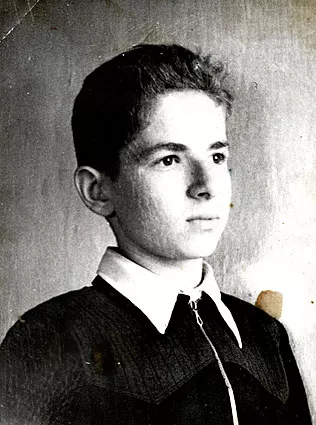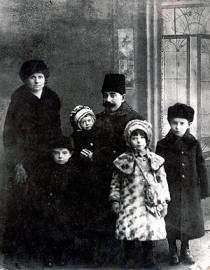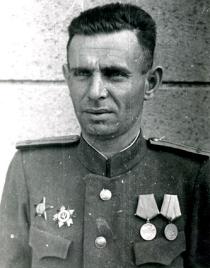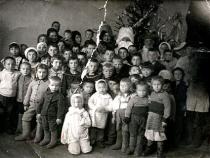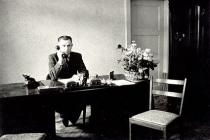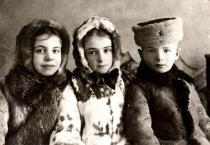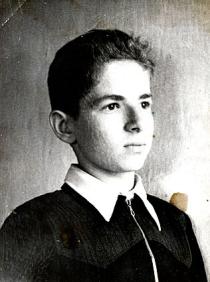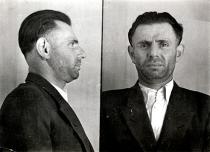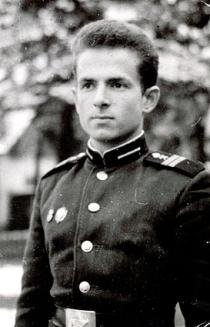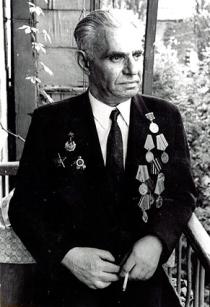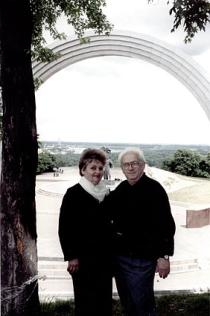I, Grigoriy Stel'makh, photographed on my birthday in Kiev in 1953. This photograph was taken by my mother.
My father went to the front in 1941. In 1945 he reached Berlin. After the victory he was assigned to the Soviet Military Administration of the town. In 1947 he came to take us to Berlin. We were taken to a wonderful apartment of 8 rooms. I don’t know what position my father had, but we had a nice life. We had a housemaid and food supplies. We had many clothes. We went to and from school by car. The school had a nice pioneer camp on the Baltic Sea. We had our hair cut short and had forelocks and Germans recognized us immediately. They were patient about our fooling around. They didn’t complain and were afraid of our administration. We were up to mischief and became insolent.
In 1949 my father was arrested by KGB. He was accused by article 58, item 10: anti-Soviet agitation and propaganda and was sentenced to 10 years in jail. We had a long and hard life without our father. In early March 1949 I, my mother and sisters arrived in Kiev from Berlin, where we lived. There was no place to live and our wanderings began. We stayed with aunt Frania in Kiev or went to Dvoira in Vasilkov. I went to school in Kiev. I don’t know whether they knew about my father at school, but they never showed it. I told everybody that my father was on service in Germany. I didn’t become a pioneer in Germany for some misconduct. In Kiev I lied that I was a pioneer. I didn’t take part in public activities and tried to not attract attention to my personality. I didn’t apply for Komsomol membership at school. I was afraid of having to indicate where my father was in the application form and they would not admit me and would know that my father was an ‘enemy of the people’. My mother worked as a shop assistant for some time, but she was mainly selling what we had from Germany: crystal, crockery, fabrics and underwear. She took these to special stores and this was what our family was living on for some time.
In September 1954 my father was released. On 14 August 1956 the Military Collegium of the supreme Court of the USSR reviewed the case of Isaac Stel'makh and closed it for absence of corpus delicti. My father was rehabilitated. We could finally live as the family. My father soon became director of the catering trust and a well-respected man. My mother didn’t work. My mother and father had the biggest room, my grandmother and sisters lived in another room and I had the smallest room. My grandmother did the housekeeping till she fell ill and became bedridden. She kept the Jewish spirit at home. We had traditional Jewish food at home: gefilte fish, sweet and sour stew and strudels with jam. On Friday she cooked a festive meal, put on a white kerchief, prayed and lit candles. On Saturday my father and she went to the synagogue arm-in-arm. Although it was dangerous for a member of the party to go to the synagogue, my father said that he feared nothing any more, and he said it jokingly, it seemed to me. On Pesach he always bought matzah at the synagogue. I often went to see my grandfather Abram and grandmother Yenta. My grandfather read extracts from the Torah to me, explained what I didn’t understand and told me about the Jewish history.
After leaving school in 1959 I worked in a shop few months and then I went to the army. I served in the engineering troops and my unit was in Kiev region. I have good memories about the army. There was no discrimination and senior comrades always supported the newcomers. We had plain, but sufficient food.
